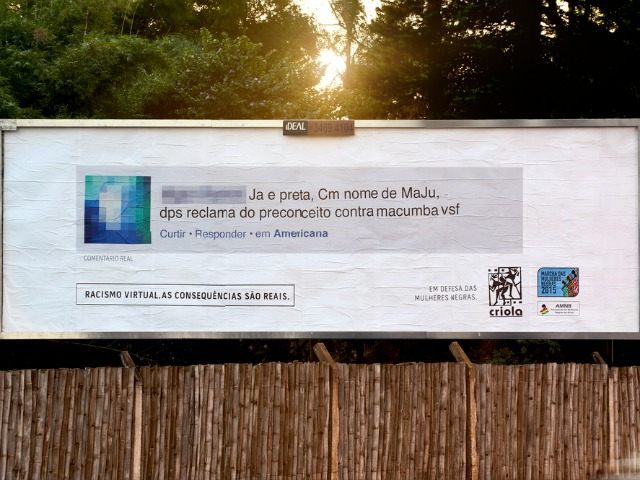A Brazilian civil rights group is using public shaming tactics in a bid to stop racist comments being made on Facebook and Twitter.
Once an offending comment is found, the group identify the person making the comments, purchase billboard space near the individual’s home, and then place the offending comment on a campaign poster. Any identifying qualities, such as avatar, photographs, and names are blurred out.
Criola, a civil rights group founded by black women in 1992, began the campaign after Brazilian TV network Rede Globo’s first black meteorologist Maria Julia Coutinho was subject to racial abuse on Facebook in July. Entitled “Virtual racism, real consequences,” the campaign has been running since the summer but has recently caught the attention of the tech media after Brazil’s “National Day of Black Consciousness” on Nov 20th.
Founder of Criola Jurema Werneck said that the campaign wasn’t meant to target anyone or to incite anyone to take action against those making racist comments: “We omit names and faces of the authors because we have no intention of exposing anyone. We just want to educate people so that in future they think about the consequences before posting racist comments.”
She added, “the action is intended to show that the web is not a free territory for the display of messages of hate, racism and prejudice and that actions will have consequences for their authors.”
While no-one would champion racist behaviour, the campaign does generate multiple privacy concerns. It certainly isn’t beyond the realms of possibility that even with a pixelated image that those making the offending posts could be identified, especially given the geo-targeted nature of the billboards.
It is also worth noting there are already laws in Brazil that cover this territory. The law prohibits, and provides jail terms for, any incitement of racial discrimination or prejudice. The same law covers racial epithets and symbols. While some say that they do not do enough to enforce this, Brazil has had a number of high profile cases in recent years that the legal system isn’t afraid of prosecuting anyone, regardless of social standing.
Brazilian soccer player Danilo Larangeira, who was contracted to Italian club Udinese at the time, was sentenced to a year in jail for spitting at a black player and calling him “macaco,” the Portuguese word for monkey, in 2013. This was later reduced to a $138,750 fine on appeal.
Two years prior to that, in a landmark case, lawyer Isaac Duarte de Barros Júnior was sentenced to two years in prison for writing an article in a newspaper that described indigenous people, specifically Guarani Indians, as “vagrants” and “tramps.” He also stated, “The preservation of traditions which contradict modernity is retrograde and must end.”
With such laws in place it has to be asked why such additional measures are required when it is straightforward enough to report instances of racism to the authorities and the social media platforms that act as a conduit for them.
Follow Richard Lewis on Twitter @RLewisReports.

COMMENTS
Please let us know if you're having issues with commenting.